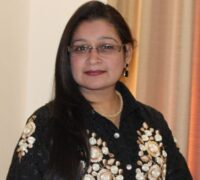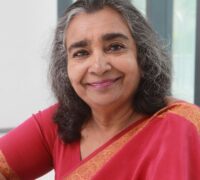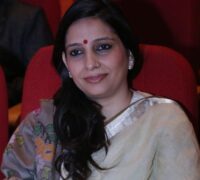
The theory of equality will change the workplace forever
In the early 1900s, Einstein’s Theory of Relativity, E = mc², reshaped our understanding of the universe and changed the world as we knew it. The Theory of Equality™, E = FQ²,...
September 27, 2023 in The Female Quotient
Low-income countries continue to struggle with substantial gender inequalities in education....

According to the World Bank, girls’ primary school enrolment stands at 78% in low-income countries, compared to the global average of 88%. As young girls progress through the schooling system in these countries, the situation deteriorates, with just 31% signing up for secondary school.
Why is this the case, and how can this critical issue be resolved? At the FQ’s recent Equality Lounge sessions, a panel of speakers took part in an insightful conversation advocating for equitable access to education for the next generation of girls in low-income countries.
Moderator Mandy Sanghera, a philanthropist, entrepreneur, and human rights activist, threw light on the intricacies of the challenges faced by girls in low-income countries.
She emphasized a critical aspect that often gets overlooked: the intersectionality of these challenges. Not all girls in these regions experience the same obstacles. Girls with disabilities, for example, confront a myriad hurdles when it comes to accessing education. In many low-income countries, girls with disabilities are less likely to be enrolled in school compared to their non-disabled peers. This alarming disparity paints a stark picture of the uphill battle these girls face in their pursuit of education.
Research conducted by UNICEF demonstrates that when young girls are pushed towards education, they become more energetic and engaged community members. They are more likely to participate in local administrative processes and contribute to socio-economic development.
Pranita Achyut (Director, Research and Program, International Center for Research on Women) highlighted the transformative power of girls’ education. She pointed out that girls who obtain education tend to practice improved individual outcomes. They are more likely to lead better lives, make well-versed decisions about their well-being, and have a stronger sense of self-determination. In these cases, they obtain knowledge and skills that can protect them from exploitation and destructive practices.
She spoke of the success of the Indian government’s Beti Bachao, Beti Padhao ( ‘Save the girl child, educate the girl child’) program and emphasized that educated girls tend to marry later in life, which results in lower birth rates and improved maternal and child health. As a result, nations with higher rates of girls’ education often experience a demographic dividend, which can lead to increased economic productivity and stability.
Gowri Ishwaran, Vice Chair of The Global Education & Leadership Foundation), mentioned the pivotal role of leadership and mentorship in empowering girls in low-income countries. Leadership, both within the education system and the broader community, plays a central role in advocating for and facilitating girls’ access to quality education. Mentorship programs complement this by offering a personalized support system that can make a profound difference in a girl’s educational journey.

“When you are working in schools it is very important to work with the mothers as well, especially in schools with underprivileged pupils. If you just work with the girl students and you do not involve the mothers, a lot of what we want to get done doesn’t get achieved.”– Gowri Ishwaran
A study by St. Cloud State University has shown that such mentorship can significantly improve educational outcomes. For example, a study conducted in sub-Saharan Africa found that girls who participated in mentorship programs were more likely to complete secondary education. Such programs also boost girls’ confidence and leadership skills.
The insights shared by the panelists accentuate the multifaceted nature of the issue and the need for a holistic approach to bridge the gender gap in education in low-income countries. It also emphasizes the long-term benefits of investing in girls’ education and the pivotal role of community engagement and mentorship in achieving this goal.
Renuka Rautela, National Project Officer at UNESCO MGIEP, emphasized that achieving these goals requires commitment at every level of the education system, supported by necessary investments in programs and evidence-building.
She highlighted that the path toward inclusive, transformative education is not just about empowering girls but also about acknowledging that education should empower all, irrespective of gender. In this regard, it is essential to avoid an instrumental approach to inclusiveness which could inadvertently exclude others. She stressed the need to position inclusiveness within the broader context of social justice, aligning with the global commitment to leaving no one behind.
Rautela then delved into two crucial aspects of inclusive education for girls. First, girls are not a homogenous group. Their gender identities intersect with various other identities that shape their aspirations and experiences. To truly make education inclusive, it must take into account these diverse identities and needs.
She also flagged the risk of marginalizing boys in the pursuit of inclusive education for girls. Through their research at IRW, it has become evident that schools and education systems play a significant role in shaping gender notions, including stereotypes related to masculinity.
Seema Rajput Verma, Founder and CEO of DVnity Serves, pointed out that one of the cornerstones of these initiatives is the active involvement of parents. Research by the Department of Education in India shows that when parents are involved and well-versed about the benefits of education, they are more likely to support their daughters’ schooling. She highlighted instances where parents were mobilized through awareness campaigns, workshops, and community meetings, leading to a shift in attitudes and behaviors.
In many regions, community leaders hold significant sway over decision-making processes. By gaining their support and endorsement for girls’ education, these initiatives gain credibility and momentum.
She emphasized the need to tap into the power of local communities. With concrete examples of local success stories, she showed how community-driven programs led to a significant rise in girls’ attendance and enrolment in schools. These programs are not just hypothetical solutions but real-world approaches that have yielded tangible results.
This article is based on a panel discussion from The Female Quotient’s (FQ) Equality Lounge sessions at the G20 Summit in New Delhi. IMD is an academic partner of The Female Quotient, which joins forces with companies and leaders to curate experiences, thought leadership, and solutions designed to achieve gender equality in the workplace and beyond.

Philanthropist, Entrepreneur, Global Human Rights Activist

Director, Research and Program, International Center for Research on Women

Founder and CEO, DVnity Serves

Vice Chair, The Global Education & Leadership Foundation

National Project Officer, UNESCO MGIEP

Chairperson, Amity School of the Arts and Fashion and President, Amity Arts Foundation

January 21, 2025 • by Shelley Zalis in The Female Quotient
In the early 1900s, Einstein’s Theory of Relativity, E = mc², reshaped our understanding of the universe and changed the world as we knew it. The Theory of Equality™, E = FQ²,...

June 12, 2024 • by Shelley Zalis in The Female Quotient
Women often step back from their careers because caring responsibilities usually fall on them by default, thanks to outdated societal norms....

March 22, 2024 • by Shelley Zalis in The Female Quotient
Educate yourself, keep up-to-date, and share your knowledge to exploit the potential that AI has to offer....
 Audio available
Audio available
December 8, 2023 in The Female Quotient
Climate finance is the hottest topic on the table when it comes to doing something tangible about climate change. We urgently need to propagate the “hows” around investing in positive values....
Explore first person business intelligence from top minds curated for a global executive audience